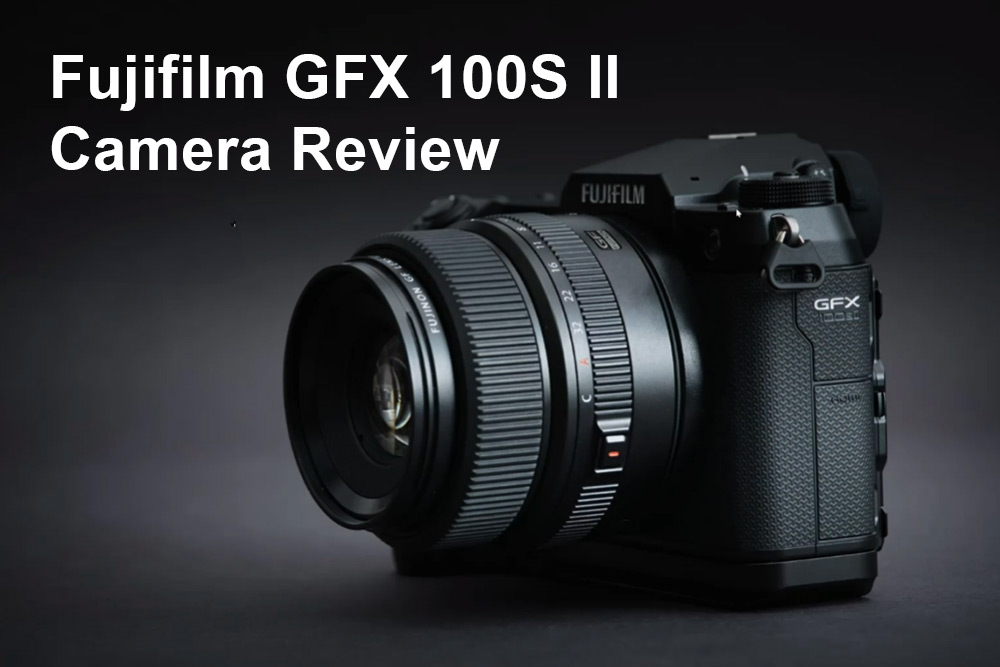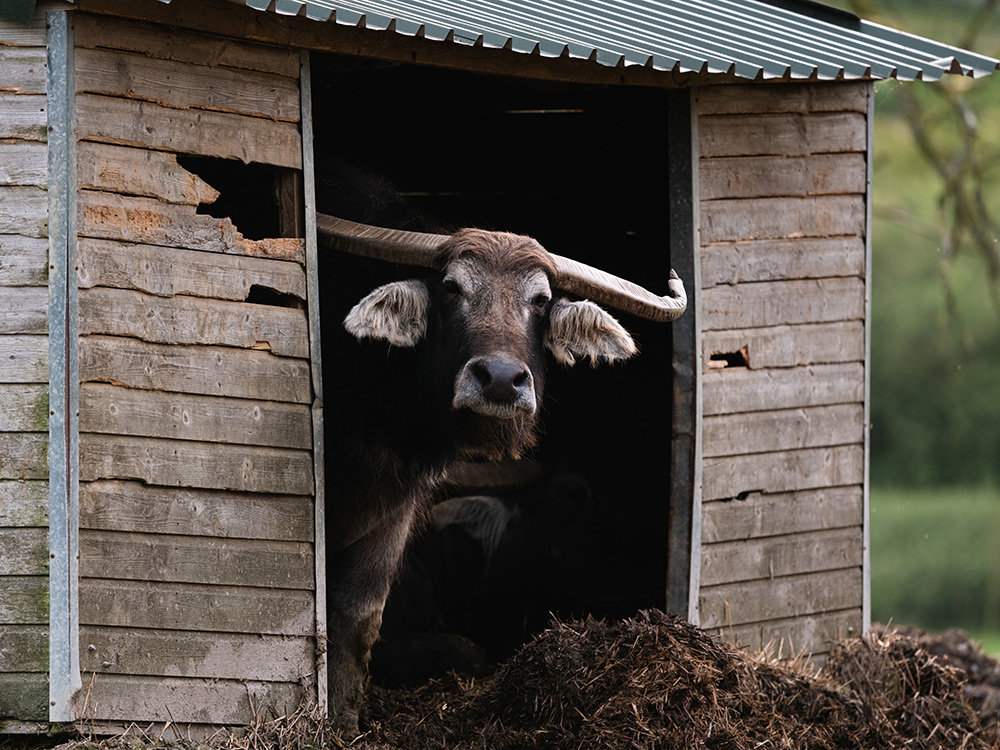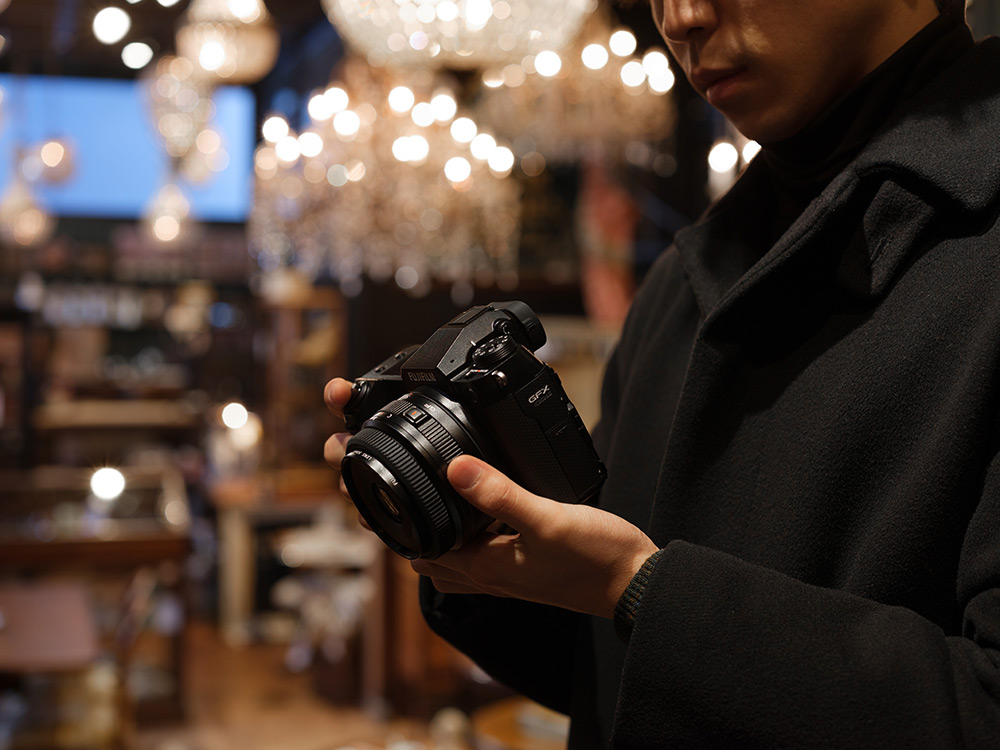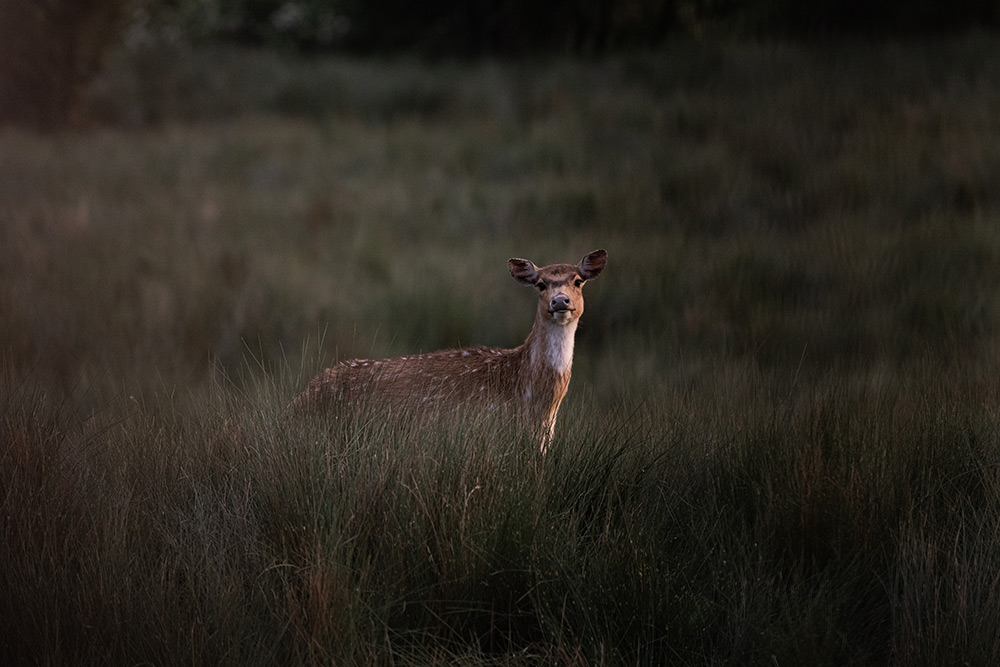- Call us: 01444 237070
- Contact Us
- Stores
- Sign In / Register
-
- Back
- Used Cameras
- Used Accessories
- Used Lenses
- Used Video
- Used Film Equipment
- Used Stock Alert
- Used Blank Test
- Sell or Part Exchange
- Used Clearance
- Recently Added Used Equipment
- Park Picks
- All Used Black Friday Deals
- Faulty
- Trade-In
- Blog
- New in
- Call us
- Contact us
- Stores
- Sign in
- Categories
- Tips & Inspiration
- Reviews
- News
- Events
- Features
- Buying Guides
- Competitions
Fujifilm GFX 100S II Camera Review
Having updated the flagship medium format GFX 100 II camera in September of 2023, Fujifilm has turned their attention to the compact and more accessible GFX 100S series body, releasing the second-generation GFX 100S II on 16 May 2024.
Fujifilm GFX 100S II Video Review | Best of Both Worlds?
Our first look Fujifilm GFX 100S II Camera Review explores the upgrades, and compares specs with the flagship GFX 100 II and previous generation 100S, in order for you to see how the new model fits into the range.
Fuji medium format digital cameras have become synonymous with image quality and versatility, combing many of the benefits which mirrorless cameras offer, with larger medium format sensors.
Continue reading to learn more, whether you're contemplating an upgrade, considering joining the GFX medium format system, or just curious about the features this hand-holdable hybrid medium format camera has to offer.

How much is the GFX 100S II camera?
The GFX 100S II camera costs £4999.00, making it £2000.00 less expensive than the flagship GFX 100 II. This also ensures it is priced competitively with high-resolution full-frame cameras from other brands, encroaching on the cost of high-end full-frame bodies.

How much bigger than full-frame is the Fuji GFX 100S II sensor?
The GFX 100S II camera features a sensor that’s larger than full-frame, which is Fujifilm’s new 102MP BSI CMOS II medium format sensor. Measuring 43.8mm x 32.9mm it’s around 1.7x bigger than a 35mm full-frame sensor, providing subtle advantages for image quality and depth of field.
The 102 megapixel resolution enables the camera to capture stills images, which measure a maximum 11648 x 8736 pixels in 4:3 format. Fujifilm has also added support for HEIF files to the GFX 100S II, which are around 30% smaller than JPEG, yet capture 10-bit colour depth vs 8-bit.
What are the key GFX 100S II feature updates?
The GFX 100S II improves on the first generation GFX 100S body with numerous upgrades and its key features include:
- 102MP BSI CMOS II sensor
- X-Processor 5 with 425 AF points
- Updated AF algorithm, which improves AF speed and accuracy
- Enhanced AI subject detection and tracking with Animal/Bird/Automobile/Motorcycle&Bike/Airplane/Train
- Enhanced native ISO with base ISO 80 for stills (16-bit RAW)
- Quicker burst shooting at 7fps
- Recording to external SSD hard drive via USB-C
- Improved IBIS up to 8.0 stops
- Internal recording in 4K/30p 4:2:2 10-bit
- External recording with an external video recorder in ProRes or BlackMagic RAW
- Adobe frame.io camera to cloud support
- F-Log and F-Log 2 for 13+ stops of dynamic range
- Upgraded in-body stabilisation up to 8-stops with compatible medium format GF lenses
- Updated EVF with 5.76 million dot and 0.84x magnification
- Dual UHS-II SD memory card slots
- 20 digital film simulation modes including an additional REALA ACE
- Lowest weight of 883g
Fujifilm has adeptly balanced the lineup with the next-generation GFX 100S II, positioning it as a medium format camera that appeals to advanced enthusiasts and professional photographers. This strategy effectively allows the GFX 100 II to maintain its flagship status, while ensuring the GFX 100S II includes substantial upgrades over the first generation.

Fujifilm GFX 100 II vs 100S II vs 100S cameras compared
The comparison table below compares key specifications between the GFX 100 II, GFX 100S II and first generation 100S, demonstrating the incredible features, which these cameras now offer hybrid creators.
|
|
|||
|
Release Year |
2023 |
2024 |
2021 |
|
Image sensor |
43.8mm x 32.9mm CMOS II HS |
43.8mm x 32.9mm CMOS II |
102MP 43.8mm x 32.9mm CMOS |
|
Effective pixels |
102 MP |
102 MP |
102 MP |
|
Processing Engine |
X-Processor 5 |
X-Processor 5 |
X-Processor 4 |
|
Storage media |
SD Card UHS-II x1 CFexpress x1 SSD (external) |
SD Card UHS-II x2 SSD (external) |
SD Card UHS-II x2 |
|
EVF |
EVF-TL1 EVF Tilt Adapter compatible, 9.44-million-dot with 1.0x magnification. |
Fixed 5.76K dot OLED colour viewfinder / .84x magnification |
Fixed 3.69 dot OLED colour viewfinder / .77x magnification |
|
LCD |
3.2 inch Tilt-Type (Three Direction) Touch Screen Colour LCD Monitor with 2.36 million dots |
3.2 inch Tilt-Type (Three Direction) Touch Screen Colour LCD Monitor with 2.36 million dots |
3.2 inch Tilt-Type (Three Direction) Touch Screen Colour LCD Monitor with 2.36 million dots |
|
Max image quality |
16bit RAW |
16bit RAW |
16bit RAW |
|
Native ISO Stills |
ISO 80 - 12800 |
ISO 80 - 12800 |
ISO 100 - 102400 |
|
Native ISO Movies |
ISO 100 - 12800 |
ISO 200 - 12800 |
ISO 200 - 12800 |
|
Max. Image stabilisation |
8.0 stops |
8.0 stops |
6.0 stops |
|
Continuous shooting RAW Compressed (mechanical shutter) |
8 fps |
7 fps |
5 fps |
|
Buffer capacity RAW compressed |
325 frames (CFexpress) |
1000+ frames |
16 frames |
|
Max video quality internal |
8K/30p / 4K/60p 4:2:2 10bit |
4K/30p 4:2:2 10bit |
4K/30p 4:2:2 10bit |
|
Film simulation modes |
20 |
20 |
19 |
|
Battery life for still images approx |
540 frames (NP-W235) |
530 frames (NP-W235) |
460 frames (NP-W235) |
|
Weight (including battery and memory card) |
1030g |
883g |
900g |
Is the new Autofocus better?
Yes, through the adoption of the CMOS II sensor and fifth generation X-Processor 5, the GFX 100S II camera is able to offer wider AF coverage. An updated algorithm and enhanced AI-subject detection also improve the range and accuracy of subjects, which are recognised and tracked, providing all-round better AF.
Not only are human faces and eyes covered through AF, but this camera enhanced recognition of animals, birds, motorcycles, bicycles, airplanes, and trains.

400MP Pixel Shift Multi-Shot
By manipulating the In-Body Image Stabilisation (IBIS) mechanism, the GFX 100S II’s Pixel Shift Multi-Shot enables 4x resolution, while retaining faithful colour reproduction. The high res. function shifts the image sensor by 0.5 pixels and captures 16 RAW images in a quick succession.
Dedicated software Pixel Shift Combiner is then used to combine the 16 RAW files to generate a 400MP image. The camera can produce an image of approximately 400 million pixels (in the case of the "High Resolution + Real Color" method). In addition, by changing the control method within the camera body and combining four RAW files shot by shifting one pixel at a time, an image of approximately 100 million pixels can be generated (in the case of the "Real Color" method).
Is the mark 2 faster than the original GFX 100S?
Thanks to the adoption of the fifth generation X-Processor 5, the GFX 100S II gets another resounding yes, with enhanced speed while improving battery efficiency. Experience quick start-up times, a faster EVF refresh rate, quicker burst shooting and shutter speeds as fast as 1/32,000 second in electronic shutter mode.

Sample 01. Fujifilm GFX 100S II with GF 500mm f/5.6 R LM OIS WR Lens @500mm. Camera settings: 1/250 sec. f/5.6. ISO 800
20 vs 19 Film Simulation modes
The addition of the REALA-ACE film recipe adds an everyday profile with slightly reduced saturation and similar tonality to PRO Neg. Std. Getting Started with Film Simulation Modes is easy and provides unique results straight out of camera, without the need for post processing.
Colour profiles digitally replicate Fujifilm’s legendary cine film styles too, with recipes like ETERNA, which provides a flat, low saturation style, with greater flexibility for colour processing.

Is the Fujifilm GFX 100S II good for video?
Fujifilm is targeting hybrid content creators with the GFX 100S II, which enables you to capture full width cinematic 4K/30p internally in 4:2:2 10-bit, as well as RAW ProRes and BlackMagic over HDMI. F-Log2 has been added, with 13+ stops of dynamic range and additional post-processing latitude.
The ability to record in F-Log 2 gives filmmakers more flexibility during post-production with broader adjustments available for luminance, saturation, and other attributes.
Numerous features are available to support video production, such as Waveforms, Vectorscope and a Rec Frame indicator, streamlining the process and keeping you in control.

Sample 04. Fujifilm GFX 100S II with GF 500mm f/5.6 R LM OIS WR Lens @500mm. Camera settings: 1/400 sec. f/7.1. ISO 3200
Is the GFX 100S II user-friendly?
Thanks to some thoughtful updates, the second-gen. GFX 100S II is an even more user-friendly hand-holdable medium format camera body than the previous model. A new ‘Bishamon-tex’ leather textured body and grip are immediately apparent, providing improved styling and handling while handholding.
Additional features which contribute to excellent ergonomics include:
- Recording to SSD external hard drives via the USB-C port
- Updated higher resolution and magnficiation EVF
- 3-way tilting LCD screen with touch control
- Built-in frame.io connectivity
- Up to 8.0 stops IBIS
- C1-C6 PASM dial
- 8-Way AF lever
- Viewfinder selector
- Custom Fn button
- F/R command dial
- Movies / Stills selector switch
- Drive button
- Auto bracketing Fn
- Compatible with optional MHG-GFX-S Metal Hand Grip
Dual UHS-II SD card slots are also available and SD memory cards are ubiquitous, with the fastest UHS-II cards able to keep up with 4K video recording and 7fps burst in 102 megapixel RAW. This user-friendly format ensures you can have plenty of low cost storage alongside high-speed SSD drives for every situation.

Sample 02. Fujifilm GFX 100S II with GF 500mm f/5.6 R LM OIS WR Lens @500mm. Camera settings: 1/500 sec. f/5.6. ISO 800
Connectivity
As a hybrid camera the GFX 100S II includes extensive connectivity catering to stills and video creators. This begins by adopting the X100 VI and GFX 100 II’s built-in frame.io connectivity, which delivers photos and video automatically to the cloud, revolutionising how you can create, edit, and share content.
Additional connectivity includes:
- 2.5mm remote jack
- 3.5mm microphone/headphone jack
- Hot shoe
- USB-C
- External SSD
- Micro HDMI
- PC Sync
- WiFi / Bluetooth (IEEE802.11a/b/g/n/ac and Bluetooth Ver. 4.2)
Fujifilm GFX lenses
The GFX system is complemented by exquisite GF lenses, including the system’s first ever medium format super telephoto released simultaneously. The lens lineup spans over 20 models, thanks to ongoing releases including the Fujifilm GF 500mm f/5.6 R LM OIS WR Lens.
Choose anything from the newest standard Fujifilm GF 55mm f/1.7 R WR Lens, which features 11 rounded diaphragm blades and a bright maximum aperture, two specialist options such as the wide angle Fujifilm GF 30mm f/5.6 Tilt Shift Lens or the mid-telephoto Fujifilm GF 110mm f/5.6 Tilt Shift Macro Lens. These provide T/S capabilities, and promise outstanding image quality with versatile features.
Discover which GFX lenses are currently available, and those on the horizon in our Fujifilm G Mount Lens Roadmap.

Sample 03. Fujifilm GFX 100S II with GF 500mm f/5.6 R LM OIS WR Lens @500mm. Camera settings: 1/400 sec. f/7.1. ISO 3200
Best GFX 100S II accessories
The MHG-GFX-S Metal Hand Grip is a must-have 100S II accessory, adding Arca-Swiss type connectivity as well as better grip, especially when longer and heavier lenses are mounted to the camera body. Other essential accessories include at least one spare NP-W235 Li-ion battery, which adds 530 shots in economy mode.
You can also add a Fujifilm compatible flashgun, with the GFX-series compatible with Fujifilm EF-60 Flashgun, the EF-X500 flash, as well as the Fujifilm EF-W1 Wireless Commander for off-camera lighting.
Conclusion
The next-generation Fujifilm GFX 100S II is an accessible medium format camera, which encroaches into full-frame camera pricing, whilst offering professional photographers, serious enthusiasts and hybrid shooters the benefits of a medium format system.
The mark 2 merges upgrades to the camera body, internal technology and overall ease-of-use, while still producing beautiful 102MP images, full sensor width wide dynamic range cinematic 4K movies, with faster with more accurate autofocus for both stills and video.
Reserve your Fujifilm GFX 100S II camera today and take advantage of the incredible imaging potential this hand-holdable medium format system offers.
If you’re upgrading from a previous GFX camera, or have other unwanted camera equipment, grab a free trade-in quote, and use the money made selling your camera to offset against the cost of the GFX 100S mark II.
Share this post:
By NIck Dautlich on 16/05/2024

Trade in your old equipment
Fast and easy trade in service ensures your old gear is collected efficiently and you are paid quickly! It's very simple to trade in your unwanted photography gear. Just head over to our dedicated Sell or Part Exchange page, fill out the details, and we'll get back to you with an offer for your old gear. Take the cash, or put it towards the cost of your new gear. It's up to you! Find out more
sign up to the newsletter
Keep up to date on the latest photography news, events and offers. Sign up now